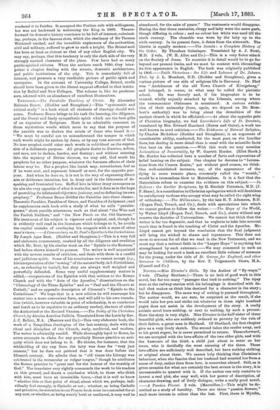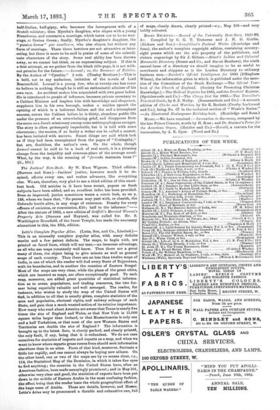NOVELS.—Mise Elvester's Girls. By the Author of "By-ways.' 3 vols.
(Tinsley Brothers.)—There is no lack of good work in this novel, but far too many "passages that lead to nothing." The tipsy man at the railway-station with his belongings is described with de- tail that makes as think him destined for a character in the story ; but he disappears. The same way of writing is pursued throughout. Theauthor would, we are sure, be surprised at the result, if she. would take her pen and strike out whatever in these eight hundred pages does not assist in the development of the story. A really artistic novel loses nothing, or next to nothing, by such a process- Here the story is very slight. Miss Elvester is the half-sister of three beautiful girls, who are suddenly reduced to poverty by the ruin of their father, a great man in Shetland. Of Shetland, the first chapter give us a very lively sketch. The second takes the reader away, and to his great regret, he is never permitted to return. Thenceforward, we are occupied with the love-affairs of the two elder girls, and with the humours of the third, a child just about to enter on her teens, who is decidedly the most amusing of the three. These love-affairs are sufficiently well described, but have nothing striking or original about them. We cannot help thinking that Christian's behaviour, when she fancies that her husband had married her froma sense of duty, rather than from love, is somewhat absurd. Still, as it gives occasion for what axe certainly the best scenes in the story, it is unreasonable to quarrel with it. If the author can only contrive to invent a real plot, she may well, with her power of description, of character-drawing, and of lively dialogue, write a really good novel.. —A Passion Flower. 2 vols. (Macmillan.)—This might be de- scribed as a study of heredity. There are three "passion flowers,' each more intense in colour than the last. First, there is Myrrha, balf-gipsy, who becomes the incongruous wife of a Scotch minister ; then Myrrha's daughter, who elopes with a young Frenchman, and contracts a marriage, which turns out to be no mar- riage, at Gretna Green ; finally, Myrrha's daughter's daughter, the ' passion flower" par excellence, who also elopes, but without any 'form of marriage. These three heroines are not attractive or inter- *sting, but there is more to be said in praise of some of the sabordi- mate characters of the story. Some real ability has been thrown sway, as we cannot but think, on an unpromising subject. If this is a 'first attempt, as we gather from the blank title-page, it is not with- out promise for the future.—Lemuel;' or, the Romance of Politics. By the Author of "Cynthia." 2 vols. (Tinsley Brothers.)—This is a bold, not to say audacious, imitation of • the novels of Lord Beaconsfield. Lemuel is a young Jew, who at twenty-one has come to believe in nothing, though be is still an enthusiastic admirer of his own race. An accident makes him acquainted with two great ladies. Re is introduced to people of influence, becomes private secretary to a Cabinet Minister and inspires him with knowledge and eloquence, supplants him in his own borough, makes a maiden speech the opening of which is a ludicrous failure and the end a triumphant meows, enters the Cabinet before he is thirty, abandons public life ander the pressure of an overwhelming grief, and disappears from the scene as a Jesuit missionary among some anthropophagous savages. The story is often grotesquely improbable, bat it is told with some cleverness ; the master, if so faulty a writer can be called a master, has been imitated with success. Smart things are said which look as if they had been transplanted from the pages of " Coningsby,'> but are, doubtless, the author's own. On the whole, though Lemuel cannot be said to be a book of real merit, it is a pleasing change from the insipidity and common-place of the average novel. What, by the way, is the meaning of " fecunda marmora locas 7" (ii., 164.)



































 Previous page
Previous page